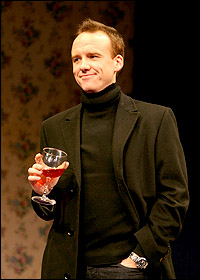
As one of the stars of Gina Gionfriddo's new Off-Broadway drama Becky Shaw — which officially opened at Off-Broadway's Second Stage Jan. 8, and has extended its limited engagement by six weeks — Barnes got great reviews for playing the lovably horrible money manager Max, a man whose ice-cold virtues include brutal and relentless honesty, eviscerating character analysis, shark-like efficiency, substantial wealth and little else. The actor talked to Playbill.com about what it's like to be one of those characters we can't get enough of on stage but would send us screaming in real life.
Playbill.com: One of the clichés about actors is that they want the audience to like them. That's a little hard with a character like Max. Was that something you struggled with?
David Wilson Barnes: No, not really. I've never really had that problem, wanting to be liked by the audience. It was Max in particular — I really like him, actually. He's a pretty upstanding person in a lot of ways.
Playbill.com: What do you like about Max?
DWB: I like that he's straightforward, honest, that he's loyal, that he doesn't dilly-dally with the details that get in his way. He moves fast. I think these are all really good qualities.
Playbill.com: Have you ever met anyone like Max?
DWB: I've met amalgamations of him, through different people. But I think Max is kind of an uber-person.
Playbill.com: You were with the play at the Humana Festival before it came to Off-Broadway. During the rehearsal process, was there a moment where you found a key to the character that helped you learn how to play him? He's a complex figure, repellent and magnetic at the same time.
DWB: It's interesting. He kind of came fairly intuitively to me. I've actually been with the play since the first workshop, which would have been in the summer of 2007. The first key I learned on how not to play him — to answer your question from the back door — came a couple weeks ago when we were doing it here in New York. I said one of the lines, and kind of made fun of [the character] Becky in saying the line. And the audience didn't respond well. I give my performance based a lot on how the audience responds, and sometimes they respond differently. I realized that I can't play Max mean. He can only be honest. He can't be demeaning.
 |
||
| David Wilson Barnes in Becky Shaw |
||
| photo by Joan Marcus |
DWB: That's right. But you can play the lines gratuitously mean. You can play it mockingly. When that happens, I think the audience just turns off. He's blunt, but he's never mean, and I think that's the key of playing him. Playbill.com: Why do you think the play's named after the character Becky Shaw, who is played by Annie Parisse? It could easily be named after your character, or Emily Bergl's character, who are actually more dominant figures.
DWB: Yeah, it's interesting, isn't it? I think it's Becky Shaw, because Becky is the catalyst for change.
Playbill.com: Everything changes when Becky arrives, it's true. Max is a very demanding part. Has this been one of the more rewarding roles you've had?
DWB: The most rewarding role. I would say, without question. I've played really great roles with really great playwrights. But I'd have to say, as a complete experience, this is it. I love doing comedy, and Max is a very funny guy. And the mix of comedy and tragedy in this play is so steep. It's incredibly rewarding.
Playbill.com: There's an interesting line at the end of your Playbill bio. It reads, "This one's for Monica, without whom I'd still be wondering when." What does that mean?
DWB: Well, Monica is my wife. The "when" is all about how two and a half years ago — when I was in Humana doing another play, Theresa Rebeck's play The Scene — I was questioning the whole acting thing. It wasn't supporting me in a way I thought it should be, and I'm really a believer that if you are doing what you're supposed to be doing with your life, the money will be there to support that life. Enough to pay your electric bill. And it hadn't really gotten there for me, and I was very frustrated. We had just come from her first viewing of The Scene, which did very well in Louisville. I was going through all these doubts about it. I was thinking, "Maybe I could direct. Maybe I could go into writing more." And she said, "You need to stop splitting your attentions in all these different places and just do this." She really believed that, that I can do this and I can support myself acting. I listened to her.
Playbill.com: And it was good advice!
DWB: It was really good advice. She's a smart person.











